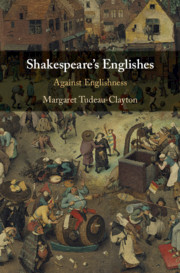Book contents
- Shakespeare’s Englishes
- Shakespeare’s Englishes
- Copyright page
- Epigraph
- Contents
- Table and Illustrations
- Acknowledgements
- Chapter 1 Introduction
- Chapter 2 Shakespeare and ‘the King’s English’
- Chapter 3 Shakespeare and ‘the true-born Englishman’
- Chapter 4 ‘they bring in straing rootes’
- Chapter 5 Figures and Parables of a ‘straing’ Word
- Bibliography
- Index
- References
Bibliography
Published online by Cambridge University Press: 07 October 2019
- Shakespeare’s Englishes
- Shakespeare’s Englishes
- Copyright page
- Epigraph
- Contents
- Table and Illustrations
- Acknowledgements
- Chapter 1 Introduction
- Chapter 2 Shakespeare and ‘the King’s English’
- Chapter 3 Shakespeare and ‘the true-born Englishman’
- Chapter 4 ‘they bring in straing rootes’
- Chapter 5 Figures and Parables of a ‘straing’ Word
- Bibliography
- Index
- References
Summary

- Type
- Chapter
- Information
- Shakespeare's EnglishesAgainst Englishness, pp. 219 - 240Publisher: Cambridge University PressPrint publication year: 2019

